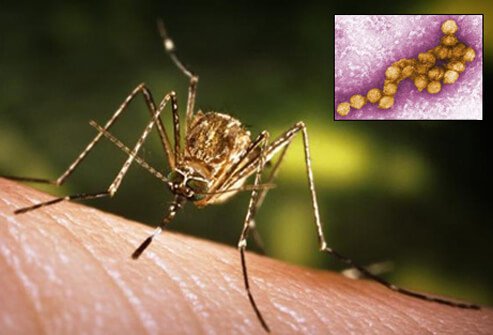West Nile Virus- Not to Worry
West Nile Virus Infection Symptoms and Risk Factors
- Medical Author: Melissa Conrad Stöppler, MD
- Medical Editor: Jay W. Marks, MD

What is West Nile virus?
West Nile virus was first observed in the U.S. during the summer of 1999 and is believed to be permanently established (endemic) in the U.S. at this time. A member of the flavivirus family, West Nile virus is related to the St. Louis encephalitis virus that is also found in the U.S. West Nile virus is commonly found in Africa, the Middle East, and in the western parts of Asia. It infects mosquitoes, birds, horses, humans, and some other mammals. In 2012, West Nile virus infections reached epidemic levels in Texas, and were reported in many other states.
How do you get West Nile?
Humans normally acquire the viral infection through a mosquito bite. The early fall, from late August to early September, is the most common time for infection to occur in the U.S. West Nile virus has the potential to cause a very serious illness, although 60%-80% of people infected will not develop any symptoms at all. The others most commonly develop a mild illness, sometimes termed West Nile fever, which is characterized by:
- fever,
- tiredness,
- headaches,
- body aches,
- swollen lymph nodes, and
- sometimes a rash.
West Nile fever develops two to 15 days following the bite of an infected mosquito and persists for a few days to a few weeks.
How dangerous is West Nile virus?
In less than 1% of cases, West Nile virus infection leads to severe illness that is referred to as “neuroinvasive” disease since it affects the nervous system. This severe form of West Nile virus infection results in an inflammation of the brain (encephalitis) or the meninges, tissues that cover the brain and central nervous system (meningitis). A combination of the two (meningoencephalitis) can also occur, and the disease can be fatal. People over 50 years of age, pregnant women, infants, and those with weakened immune systems due to medications, HIV, or cancer are at greatest risk for severe illness related to West Nile virus infection. Neuroinvasive West Nile virus infection is characterized by:
- high fever,
- neck stiffness,
- stupor,
- disorientation,
- coma,
- seizures,
- muscle weakness, and
- potentially permanent neurological disturbances.
West Nile virus infection cannot be spread by casual contact such as touching or kissing an infected person. In addition to transmission via mosquito bites, less common modes of transmission of the virus include organ transplantation, blood donation, and from mothers to their fetuses in the womb or to infants via breast milk.
How can I prevent West Nile virus?
The best way to avoid West Nile virus infection is to prevent mosquito bites. There is no human vaccine available, although a vaccine against West Nile virus has been licensed for use in horses. No specific treatment is available for the illness. West Nile fever generally resolves on its own, and those with severe infections must be hospitalized to receive supportive care.
Medically reviewed by Robert Cox, MD; American Board of Internal Medicine with subspecialty in Infectious Disease
REFERENCE:
United States. Centers for Disease Control and Prevention. “West Nile Virus.”
Now for Dr. D’s Information based on the Virginia Dept. of Health
According to the Virginia Department of Health Department here are their tips on how to keep your odds low of contracting West Nile Virus.
Wear insect repellent (use natural non-toxic brands do not spray on infants or small children as it can be toxic to them.
Wear light colored long and short sleeve clothing when ever possible to keep “biteable” areas covered.
Repair holes in window screens and door screens.
Keep gutters clean and clear so standing water cannot gather to breed mosquitos.
Get rid of old tires, plant pots and any container that can hold rain water. Even an ounce of standing water can breed mosquitos!
Fill low places in the yard with sand or level them with top soil.
Keep ditches clear of grass, leaves, trash and any debris so rain water doesn’t sit and accumulate in them.
Cover trash can to keep out rain water or drill a small hole in the bottom so water cannot fill the bottom of trash cans.
Add sand to outdoor plant pot trays so that not standing water accumulates there but yet your plants can stay watered.
Fill tree root holes in the yard.
Fill tree stump holes and tree branch holes in large trees with sand to stop free standing water from accumulating there.
Keep the lawn mowed and short. Keep shrubs trimmed and the bottom area around the bushes clean and neat.
For stagnant ponds or other areas where free standing water cannot be drained use environmentally safe larvicides that are safe for pets and people. Follow package instructions. This will kill mosquito larvae and not harm your pets or people if they should drink or get the water on them.
For more information visit the Virginia Dept. of Health website at, www.vdh.virginia.gov or contact your local health department.